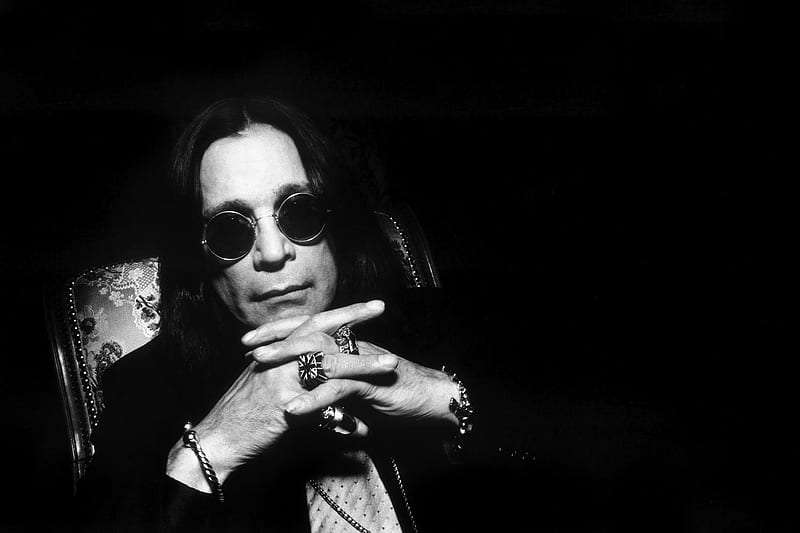Ozzy Osbourne, the Prince of Darkness, has been a dominant figure in the world of heavy metal music for decades. Ozzy came into the spotlight as lead singer for metal band Black Sabbath. Renowned for his captivating stage presence and distinctive voice, Osbourne’s electrifying performances have been enhanced by the exceptional guitar playing of numerous talented musicians who have joined him on his musical journey. Today we cover every guitar player for Ozzy Osbourne.
In this article, we delve into the guitar players who have contributed their remarkable skills to Ozzy Osbourne’s iconic sound, exploring their backgrounds, musical achievements, and the enduring impact they have made on the metal genre.

Randy Rhoads: The Guitar Wizard
Randy Rhoads, a guitar virtuoso and visionary musician, left an indelible mark on the world of heavy metal with his exceptional talent and innovative approach. His contributions to Ozzy Osbourne’s band during the early 1980s revolutionized the sound of the genre and earned him a place among the most revered guitarists in rock history.
Early Years and Musical Development
Born on December 6, 1956, in Santa Monica, California, Randy Rhoads displayed an innate musical talent from a young age. He began playing the guitar at the age of six and quickly demonstrated a remarkable aptitude for the instrument. Rhoads’ musical education included studying classical guitar under renowned guitarists such as Scott Shelly and later with classical guitarist and composer Randy Staneck.
Joining Ozzy Osbourne’s Band
In 1979, Randy Rhoads received a life-changing opportunity when he was recruited by former Black Sabbath frontman Ozzy Osbourne to join his newly formed Ozzy Osbourne’s solo band. as the Lead Guitar player. Rhoads’ distinct playing style, which blended classical and metal influences, perfectly complemented Osbourne’s dark and theatrical persona.
The Blizzard of Ozz Era
With Ozzy Osbourne, Randy Rhoads embarked on a creative journey that would define both their careers. The band’s debut album, “Blizzard of Ozz,” released in 1980, showcased Rhoads’ extraordinary guitar skills and songwriting abilities. Tracks like “Crazy Train” and “Mr. Crowley” became instant classics, characterized by Rhoads’ intricate and melodic guitar solos.
Tragic Loss and Legacy
Randy Rhoads’ impact on the world of heavy metal remains enduring. His technical prowess, melodic sensibility, and ability to seamlessly blend classical elements with heavy rock laid the groundwork for countless guitarists who followed in his footsteps. Rhoads’ style influenced generations of musicians and continues to inspire guitarists to push the boundaries of their playing.
Sadly, Randy Rhoads’ meteoric rise was cut tragically short. On March 19, 1982, at the age of 25, Rhoads died in a plane crash while on tour with Ozzy Osbourne. The loss of such an extraordinary talent sent shockwaves through the music community, leaving fans and fellow musicians mourning the untimely end of a guitar prodigy.

Jake E. Lee: The Dark Horse
Jake E. Lee, a guitarist known for his dark and heavy style, made a significant impact during his tenure as the guitarist for Ozzy Osbourne’s own band in the mid-1980s. Often overshadowed by the immense legacy of his predecessor, Randy Rhoads, Lee brought his unique musicality and powerful playing to the forefront, leaving his mark on the Ozzy Osbourne sound.
Pre-Ozzy Osbourne Career and Recognition
Prior to joining Ozzy Osbourne’s band, Jake E. Lee had already begun establishing himself as a great guitarist. He gained recognition as a member of the band Ratt, contributing his guitar skills to their debut album “Out of the Cellar” in 1984. Lee’s playing showcased a blend of heavy metal and blues influences, setting him apart from his contemporaries.
Taking Over from Randy Rhoads
Following the tragic death of Randy Rhoads, Ozzy Osbourne sought a guitarist who could fill the void left by the guitar virtuoso. In 1983, Jake E. Lee emerged as the chosen successor, joining the band and embarking on the “Bark at the Moon” tour. Lee’s playing style, characterized by heavy riffs, intricate solos, and a penchant for melody, brought renewed energy to the band’s live performances.
Contributions and Guitar Style
During his time with Ozzy Osbourne, Jake E. Lee made notable contributions to the band’s musical output. He played a pivotal role in the creation of Osbourne’s album “Bark at the Moon” (1983), co-writing the majority of the songs and showcasing his technical proficiency in tracks like the title track and “Rock ‘n’ Roll Rebel.” Lee’s guitar style was marked by his ability to blend aggression and finesse, crafting memorable and powerful riffs that added depth to Osbourne’s music.
Departure from the Band
Despite his significant contributions, Jake E. Lee’s tenure with Ozzy Osbourne’s band was relatively short-lived. Following the release of the “Ultimate Sin” album in 1986, Lee parted ways with Osbourne amidst creative differences and personal disagreements. His departure marked the end of an era for the guitarist, but it also opened doors for new musical endeavors.
Jake E. Lee’s time with Ozzy Osbourne left an undeniable impact on the band’s sound and his own musical career. His dark and heavy guitar-playing style, combined with his songwriting abilities, helped shape the direction of Osbourne’s music during the mid-1980s. While his tenure may have been relatively brief, Jake E. Lee’s contribution to Ozzy Osbourne’s legacy continues to be recognized and appreciated by fans of heavy metal music.
Steve Vai also began working with Ozzy in 1994, with whom he wrote and recorded the Ozzmosis album. Due to conflicts, the album was re-written and recorded with Zakk Wylde on guitar.
Related: Best Guitar Soloists of All Time
Zakk Wylde: The Master of Metal
Zakk Wylde, a guitar virtuoso known for his powerful and dynamic playing, has established himself as one of the most influential guitarists in the world of heavy metal. His association with the legendary Ozzy Osbourne and his own successful solo career have solidified his reputation as a master of metal and a true guitar icon.
Introduction to the Guitar World
Born Jeffrey Phillip Wielandt on January 14, 1967, in Bayonne, New Jersey, Zakk Wylde displayed a natural affinity for music from an early age. He began playing the guitar in his early teens and quickly showcased an extraordinary talent that caught the attention of those around him. Wylde’s dedication to honing his craft led him to study music at Berklee College of Music in Boston, where he further developed his skills and expanded his musical horizons.
Joining the Ozzy Osbourne Band
In 1987, Zakk Wylde had his life changed forever when he received a phone call from his musical idol, Ozzy Osbourne. Impressed by Wylde’s exceptional guitar skills, Ozzy invited him to audition for his band. Wylde’s remarkable audition secured him the position of lead guitarist for Ozzy Osbourne, marking the beginning of an enduring partnership and an electrifying era in his career.
Musical Style and Contributions
Zakk Wylde’s guitar style is characterized by its raw power, technical prowess, and soulful expression. Influenced by guitarists such as Jimi Hendrix, Randy Rhoads, and Eddie Van Halen, Zakk Wylde developed a distinctive sound that combines lightning-fast shredding, crushing riffs, and blistering solos. His signature use of pinch harmonics and his ability to infuse emotion into his playing have become hallmarks of his style.
During his time with Ozzy Osbourne, Zakk Wylde contributed to the creation of several iconic albums, including “No Rest for the Wicked” (1988), “No More Tears” (1991), and “Ozzmosis” (1995). His guitar work on songs like “Crazy Babies,” “Mr. Tinkertrain,” and the Grammy-winning “I Don’t Want to Change the World” showcased his exceptional talent and played an integral role in defining the sound of Ozzy Osbourne’s music during this period.

Gus G: The Greek Shredder
Gus G, a Greek guitarist renowned for his blistering speed and technical prowess, has made a significant impact on the world of heavy metal. From his early days exploring music in Greece to his tenure as the guitarist for Ozzy Osbourne, Gus G has solidified his reputation as a formidable shredder and a force to be reckoned with in the metal genre.
Early Life and Musical Exploration
Born on September 12, 1980, in Thessaloniki, Greece, Kostas Karamitroudis (later known as Gus G) began his musical journey at a young age. Growing up in a family of musicians, he was exposed to a wide range of musical influences, from classical compositions to traditional Greek music. Inspired by guitarists such as Yngwie Malmsteen and Ritchie Blackmore, Gus G delved into the world of heavy metal and embarked on a path to forge his own unique sound.
Becoming Ozzy Osbourne’s Guitarist
Gus G’s breakthrough moment came in 2009 when he was chosen as the guitarist for the legendary Ozzy Osbourne. His exceptional skills and stage presence caught the attention of Osbourne, who recognized Gus G’s immense talent. This opportunity catapulted Gus G into the international spotlight, allowing him to showcase his guitar virtuosity alongside one of the most iconic figures in rock history.
Related: The Guitar Player For Aerosmith: Famous Guitarists
Musical Style and Contributions
Gus G’s playing style is characterized by its lightning-fast speed, precision, and technical proficiency. Known for his ability to seamlessly blend elements of neoclassical, power metal, and hard rock singers, he creates a dynamic and exhilarating sound that captivates listeners. His contributions to Ozzy Osbourne’s music during his tenure included albums such as “Scream” (2010) and “Ordinary Man” (2020), where his blazing solos and intricate guitar work added a new dimension to Osbourne’s sound.
Related: Who Is The Guitar Player For Lynyrd Skynyrd?
Post-Ozzy Osbourne Career
Beyond his time with Ozzy Osbourne, Gus G has forged a successful solo career and has been involved in various musical projects. He formed the band Firewind in 1998, releasing numerous albums that showcase his songwriting abilities and guitar skills. Additionally, he has collaborated with renowned musicians such as Arch Enemy’s Angela Gossow and Dream Evil’s Fredrik Nordström, further expanding his musical horizons.

Conclusion
Ozzy Osbourne’s illustrious career in heavy metal has been greatly enhanced by the exceptional guitar players who have graced his band. From Randy Rhoads to Eric Clapton to Joe Holmes to Tony Iommi, each Ozzy Osbourne’s guitar players has left an indelible mark on the legacy of the music. Their distinctive playing styles, innovative techniques, and unparalleled stage presence have elevated Osbourne’s performances to new heights of sonic power and intensity.
Related: Famous Guitarists: The Guitar Player For The Eagles
